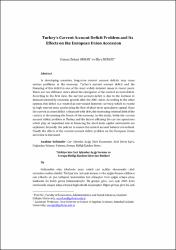| dc.contributor.author | Orhan, Osman | |
| dc.contributor.author | Nergiz, Ebru | |
| dc.date.accessioned | 2018-12-10T06:58:59Z | |
| dc.date.available | 2018-12-10T06:58:59Z | |
| dc.date.issued | 2014-06-25 | |
| dc.identifier.issn | 2148-4287 | |
| dc.identifier.issn | 2148-7189 | |
| dc.identifier.uri | https://hdl.handle.net/11363/369 | |
| dc.description | DOI: 10.17336/igusbd.93587 | en_US |
| dc.description.abstract | In developing countries, long-term current account deficits may cause serious problems in the economy. Turkey's current account deficit and the financing of this deficit is one of the most widely debated issues in recent years. There are two different views about the emergence of the current account deficit. According to the first view, the current account deficit is due to the increase in demand created by economic growth after the 2001 crisis. According to the other opinion, this deficit is a result of an overvalued domestic currency, which is created by high interest rates accelerating the flow of short-term speculative capital. Since the current account deficit is financed with debt, the increasing external debt of the country is threatening the future of the economy. In this study, firstly the current account deficit problem in Turkey and the factors affecting the current operations which play an important role in financing the short-term capital movements are explained. Secondly, the policies to ensure the current account balance are defined. Finally the effects of the current account deficit problem on the European Union accession is discussed. | en_US |
| dc.description.abstract | Gelişmekte olan ülkelerde uzun vadeli cari açıklar ekonomide ciddi sorunlara neden olabilir. Türkiye’nin cari açık sorunu ve bu açığın finanse edilmesi son yıllarda en çok tartışılan konulardan biri olmuştur. Cari açığın ortaya çıkışı hakkında iki farklı görüş bulunmaktadır. İlk görüşe göre, cari açık 2001 krizi sonrasında oluşan talep artışına bağlı olarak oluşmuştur. Diğer görüşe göre bu açık kısa vadeli spekülatif sermayenin akışını hızlandıran yüksek faiz oranları sonucu oluşan aşırı değerlenmiş yerel para biriminin bir sonucudur. Cari açık borç yoluyla finanse edildiği için ülkenin artan dış borcu ekonominin geleceğini tehdit etmektedir. Bu çalışmada, öncelikle Türkiye’nin cari açık sorunu ve kısa vadeli sermaye hareketlerini finanse etmekte önemli rol oynayan operasyonları etkileyen faktörler açıklanmaktadır. İkincil olarak, cari açık dengesinin sağlamak için politikalar tanımlanmaktadır. Son olarak Türkiye’nin cari açık sorununun Avrupa Birliği üyelik sürecine etkileri tartışılmaktadır. | en_US |
| dc.language.iso | eng | en_US |
| dc.publisher | İstanbul Gelişim Üniversitesi Yayınları / Istanbul Gelisim University Press | en_US |
| dc.rights | info:eu-repo/semantics/openAccess | en_US |
| dc.subject | Research Subject Categories::SOCIAL SCIENCES | en_US |
| dc.subject | Research Subject Categories::SOCIAL SCIENCES::Business and economics | en_US |
| dc.title | Turkey’s Current Account Deficit Problem and Its Effects on the European Union Accession | en_US |
| dc.title.alternative | Türkiye'nin Cari İşlemler Açığı Sorunu ve
Avrupa Birliği Katılım Sürecine Etkileri | |
| dc.type | article | en_US |
| dc.relation.publicationcategory | Makale - Ulusal Hakemli Dergi - Kurum Yayını | en_US |

















